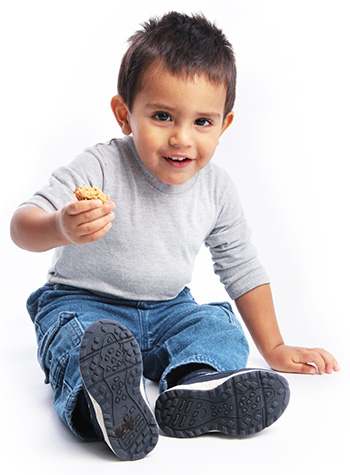What to Expect as Your Child Grows:
Well Child Care at 2½ Years
Toilet Training
- Many children will show signs that they are ready for toilet training.
- Dress your child in clothes that can easily be removed.
Signs for readiness:
- Staying dry for longer periods
- Curious about other people using the bathroom
- Communicating that diaper is wet or dirty - Develop a potty routine. Place your child on the toilet every 1-2 hours when he/she shows signs of readiness consistently.
- Don’t pick a fight about this; you’ll lose. In the long run, there will be more success using positives.
Behavior and Discipline
Set your up child for success and have reasonable expectations. Routines help your child know what to expect and will minimize tantrums.
- Divert and substitute. If a child is playing with something you don't want him to have, replace it with another object or toy that he enjoys. This “redirecting” approach avoids a fight and does not place children in a situation where they’ll say “no.”
- Teach and lead. Have as few rules as necessary and enforce them. These rules should be the rules important for the child's safety. If a rule is broken, after a short, clear, and gentle explanation, immediately find a place for your child to sit alone for two minutes. It is very important that a “time-out” comes immediately after a rule is broken.
- Make consequences as logical as possible. Remember that encouragement and praise are more likely to motivate a young child than threats and fear. Do not threaten a consequence that you do not carry out. If you say there is a consequence for misbehavior and the child misbehaves, carry through with the consequence gently but firmly.
- Be consistent with discipline. Don't make threats that you cannot carry out. If you say you're going to do it, do it. At the same time, limit the behaviors that you discipline to those that would hurt your child or hurt someone else. Saying “no” too much may mean that “no” loses its meaning.
- Be warm and positive. Children like to please their parents. Give plenty of praise and be enthusiastic. When children misbehave, stay calm and say, “We can't do that. The rule is ______.” Then repeat the rule. Be sure to also catch your children making “good choices” and praise them! This can be just as important as disciplining the “bad choices.”
Reading and Electronic Media
Read to your child every day. They may want to read the same book over and over.
Reading aloud will help your child prepare for pre-school.
Limit TV and screen time to no more than one to two hours each day. Be aware of what your child is watching.
Dental Care
- Brushing teeth regularly after meals is important. Think up a game and make brushing fun.
- Your child should have already had their first dental appointment. If not, make an appointment to have your child's teeth cleaned.
Safety Tips
- Child-proof the home. Go through every room in your house and remove anything that is either valuable, dangerous, or messy. Preventive child-proofing will stop many possible discipline problems. Don’t expect a child not to get into things just because you said not to.
- Fires and Burns
- Practice a fire escape plan.
- Check smoke detectors. Replace the batteries every twelve months.
- Check food temperatures carefully. They should not be too hot.
- Keep hot appliances and cords out of reach.
- Keep electrical appliances out of the bathroom.
- Keep matches and lighters out of reach.
- Do not allow your child to use the stove, microwave, hot curlers, or iron.
- Turn your water heater down to 120° Fahrenheit - Falls
- Teach your child not to climb on furniture or cabinets. Do not place furniture (on which the child may climb) near windows or on balconies.
- Install window guards on windows above the first floor (unless it is against your local fire codes).
- Lock doors to dangerous areas like the basement. - Car Safety
- Use an approved toddler car seat correctly. Remember the recommendations are to keep your child “rear facing” until 2 years of age. This has been proven to be the safest position for young children.
- Sometimes toddlers may not want to be placed in car seats. Gently put your child into the car seat every time you ride in the car.
- Give the child a toy to play with once in the seat.
- Parents should wear seat belts at all times.
- Never leave your child alone in a car. - Pedestrian Safety
- Hold on to your child when you are near traffic.
- Provide a play area where balls and riding toys cannot roll into the street. - Water Safety
- Continuously watch your child around any water, including buckets, play pools, and the toilet. -
Poisoning
- Keep all medicines, vitamins, cleaning fluids, and other chemicals locked away.
- Program the poison center number in all phones.
- Buy medicines in containers with safety caps.
- Do not store poisons in any drink bottles, glasses, or jars.
Smoking
- Children who live in a house where someone smokes have more respiratory infections. Their symptoms are also more severe and last longer than those of children who live in a smoke-free home.
- If you smoke, set a quit date and stop. Set a good example for your child.
Immunizations
- Routine infant vaccinations are usually completed before this age. Children should receive an annual flu shot. Ask your doctor if you have any questions about whether your child needs any vaccines.



